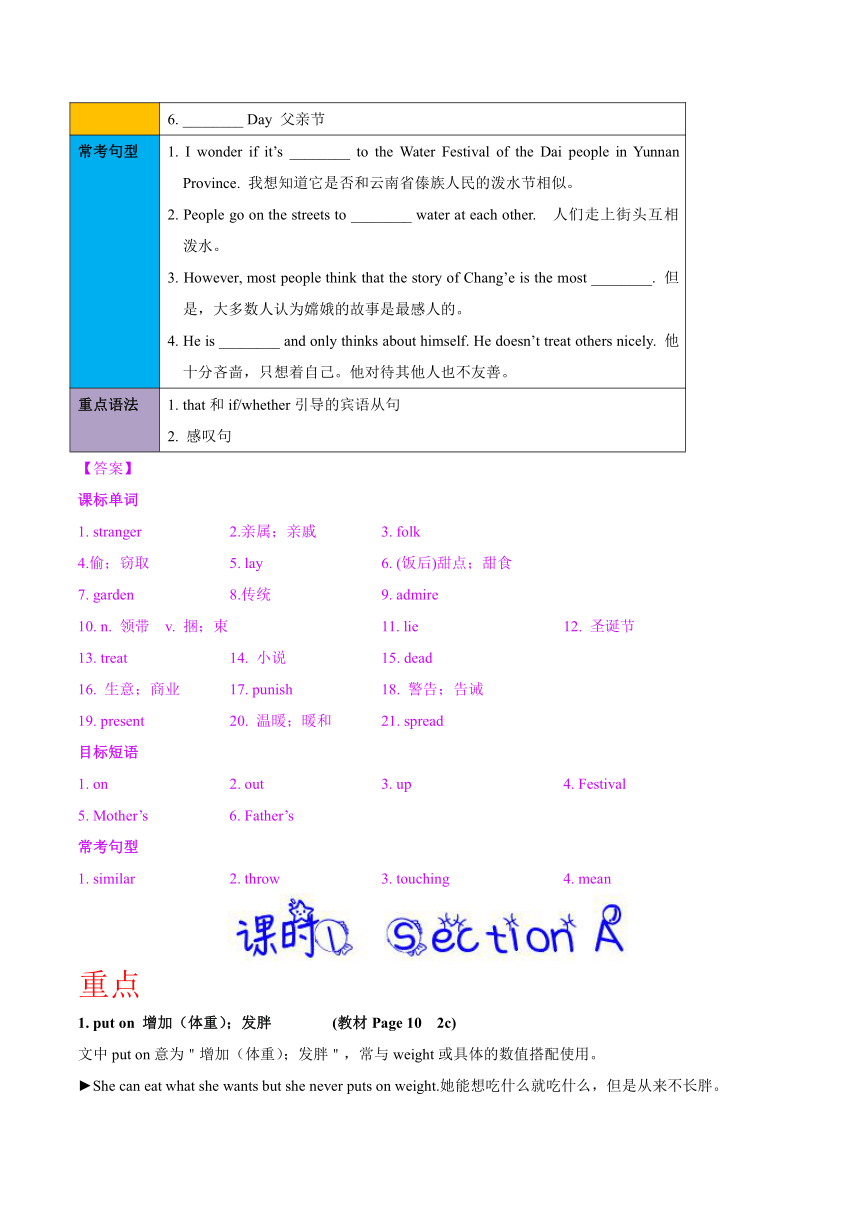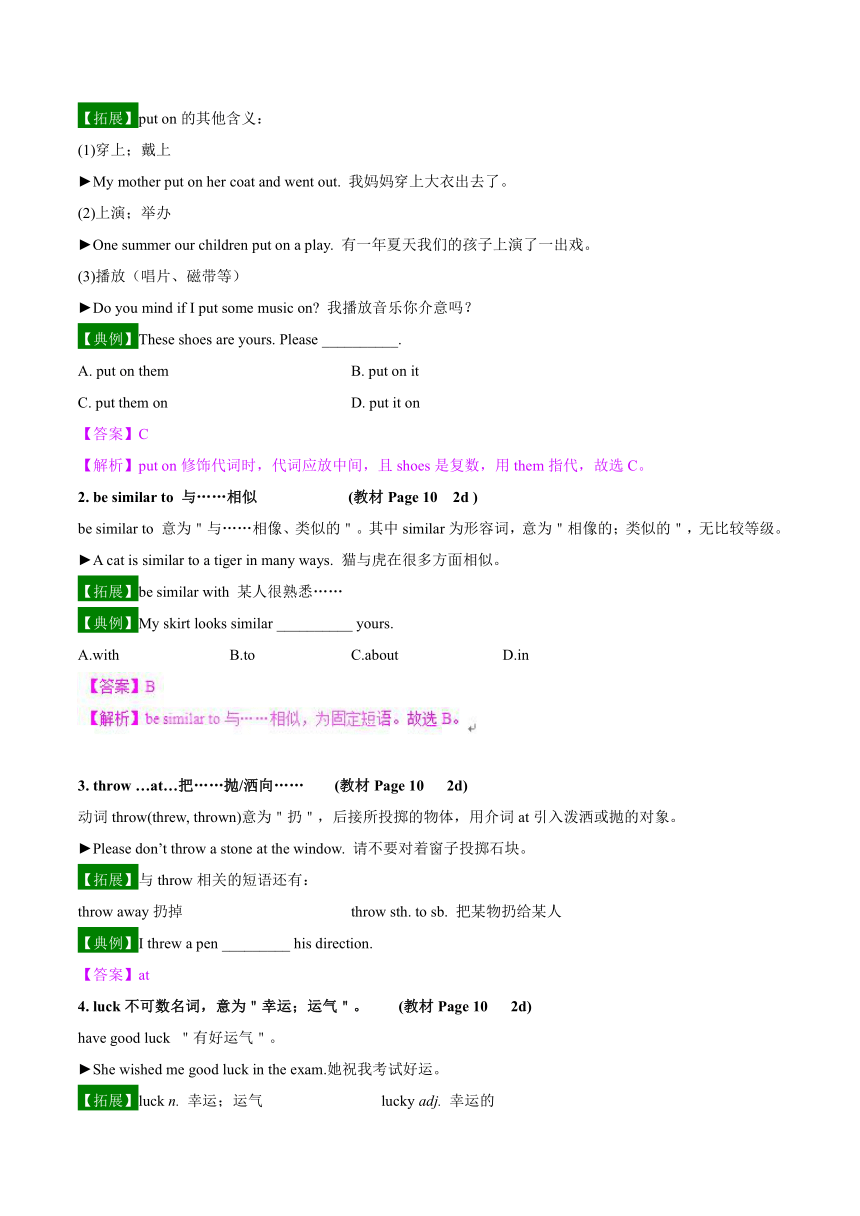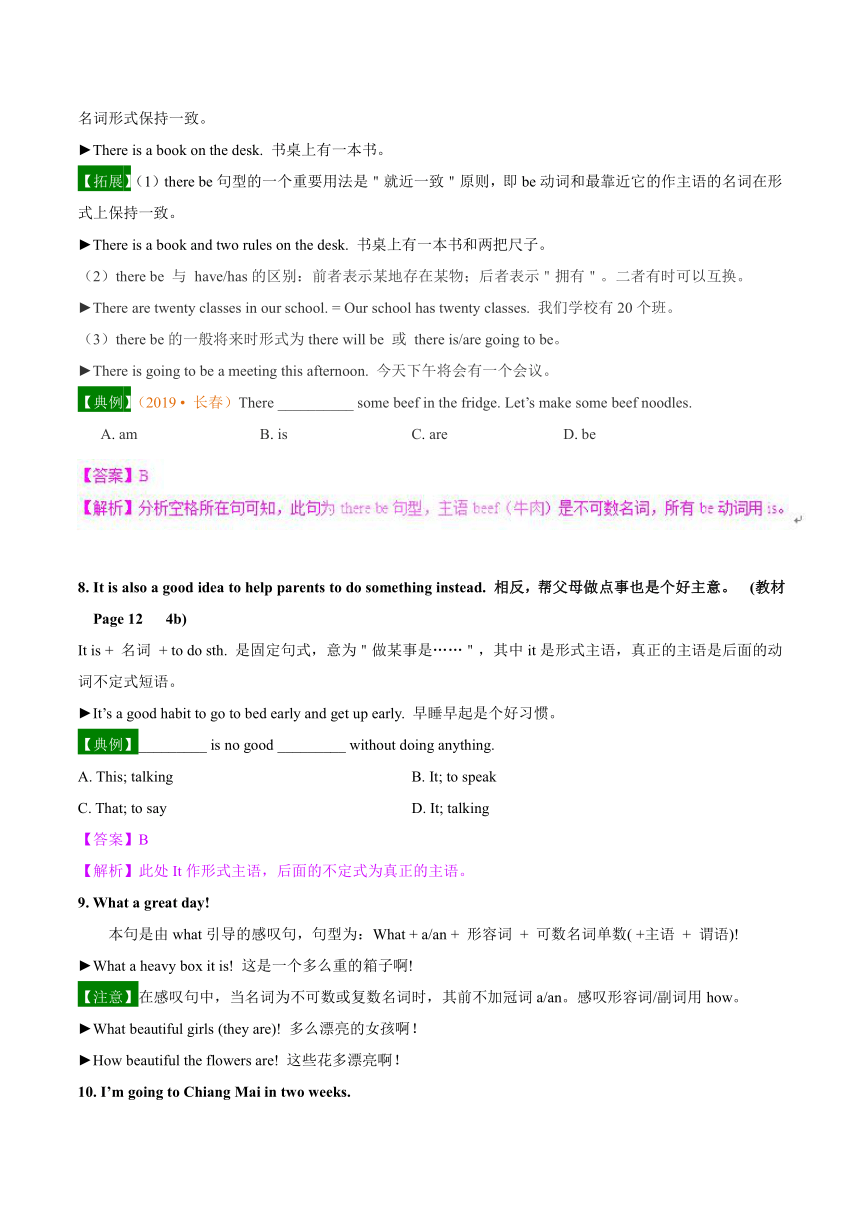人教版英语初中九年级上册知识讲解,巩固练习(教学资料,补习资料):Unit 2 I think that mooncakes are delicious! 第1课时Section A(含答案)
文档属性
| 名称 | 人教版英语初中九年级上册知识讲解,巩固练习(教学资料,补习资料):Unit 2 I think that mooncakes are delicious! 第1课时Section A(含答案) |  | |
| 格式 | zip | ||
| 文件大小 | 266.9KB | ||
| 资源类型 | 教案 | ||
| 版本资源 | 人教新目标(Go for it)版 | ||
| 科目 | 英语 | ||
| 更新时间 | 2019-09-14 16:33:30 | ||
图片预览





文档简介
知识
课标单词
1. ________ n. 陌生人
2. relative n. ________
3. ________ adj. 民间的;民俗的
4. steal v. ________
5. ________ v. 放置;安放;产(卵);下(蛋)
6. dessert n. ________
7. ________ n. 花园;园子
8. tradition n. ________
9. ________ v. 欣赏;仰慕
10. tie n. ________ v. ________
11. ________ v. 存在;平躺;处于
12. Christmas n. ________
13. ________ n. 款待;招待 v. 招待;请客
14. novel n. ________
15. ________ adj. 死的;失去生命的
16. business n. ________
17. ________ v. 处罚;惩罚
18. warn v. ________
19. ________ n. 现在;礼物 adj. 现在的
20. warmth n. ________
21. ________ v. 传播;展开
目标短语
1. put ________ 增加(体重);发胖
2. lay ________ 摆开;布置
3. end ________ 最终成为;最后处于
4. Mid-Autumn ________ 中秋节
5. ________ Day 母亲节
6. ________ Day 父亲节
常考句型
1. I wonder if it’s ________ to the Water Festival of the Dai people in Yunnan Province. 我想知道它是否和云南省傣族人民的泼水节相似。
2. People go on the streets to ________ water at each other. 人们走上街头互相泼水。
3. However, most people think that the story of Chang’e is the most ________. 但是,大多数人认为嫦娥的故事是最感人的。
4. He is ________ and only thinks about himself. He doesn’t treat others nicely. 他十分吝啬,只想着自己。他对待其他人也不友善。
重点语法
1. that和if/whether引导的宾语从句
2. 感叹句
【答案】
课标单词
1. stranger 2.亲属;亲戚 3. folk
4.偷;窃取 5. lay 6. (饭后)甜点;甜食
7. garden 8.传统 9. admire
10. n. 领带 v. 捆;束 11. lie 12. 圣诞节
13. treat 14. 小说 15. dead
16. 生意;商业 17. punish 18. 警告;告诫
19. present 20. 温暖;暖和 21. spread
目标短语
1. on 2. out 3. up 4. Festival
5. Mother’s 6. Father’s
常考句型
1. similar 2. throw 3. touching 4. mean
重点
1. put on 增加(体重);发胖 (教材Page 10 2c)
文中put on意为"增加(体重);发胖",常与weight或具体的数值搭配使用。
?She can eat what she wants but she never puts on weight.她能想吃什么就吃什么,但是从来不长胖。
【拓展】put on的其他含义:
(1)穿上;戴上
?My mother put on her coat and went out. 我妈妈穿上大衣出去了。
(2)上演;举办
?One summer our children put on a play. 有一年夏天我们的孩子上演了一出戏。
(3)播放(唱片、磁带等)
?Do you mind if I put some music on? 我播放音乐你介意吗?
【典例】These shoes are yours. Please __________.
A. put on them B. put on it
C. put them on D. put it on
【答案】C
【解析】put on修饰代词时,代词应放中间,且shoes是复数,用them指代,故选C。
2. be similar to 与……相似 (教材Page 10 2d )
be similar to 意为"与……相像、类似的"。其中similar为形容词,意为"相像的;类似的",无比较等级。
?A cat is similar to a tiger in many ways. 猫与虎在很多方面相似。
【拓展】be similar with 某人很熟悉……
【典例】My skirt looks similar __________ yours.
A.with B.to C.about D.in
3. throw …at…把……抛/洒向…… (教材Page 10 2d)
动词throw(threw, thrown)意为"扔",后接所投掷的物体,用介词at引入泼洒或抛的对象。
?Please don’t throw a stone at the window. 请不要对着窗子投掷石块。
【拓展】与throw相关的短语还有:
throw away扔掉 throw sth. to sb. 把某物扔给某人
【典例】I threw a pen _________ his direction.
【答案】at
4. luck不可数名词,意为"幸运;运气"。 (教材Page 10 2d)
have good luck "有好运气"。
?She wished me good luck in the exam.她祝我考试好运。
【拓展】luck n. 幸运;运气 lucky adj. 幸运的
unlucky adj. 不幸的 luckily adv. 幸运地;好运地
unluckily adv. 不幸地
【典例】(2018 ? 福建龙岩第一中学分校九年级上第一次月考) , the rain stopped when we went out for a walk.
A. Lucky B. Luck
C. Luckily D. Luckless
【答案】C
5. Whoever drank this could live forever, and Hou Yi planned to drink it with Chang’e. 无论谁喝了此药都会长生不老,后羿打算和嫦娥一起服用。 (教材Page 11 3a )
whoever代词,意为"无论谁;不管什么人",在此处引导主语从句,相当于anyone who。
?Whoever comes will be welcome. 谁来都欢迎。
?Whoever gains the most points wins the competition. 谁得分最多,谁就赢得比赛。
【拓展】whoever还可引导让步状语从句,相当于no matter who。
?I’m not opening the door, whoever you are. 不管你是谁,我都不会开门的。
【典例】说那话的人是个骗子。_________ says?that?is?a?liar.
【答案】Whoever
6. refuse 拒绝 (教材Page 11 3a )
动词,意为"拒绝",其后常接动词不定式,即refuse to do sth.意为"拒绝做某事"。
?I refused his invitation. 我拒绝了他的邀请。
?I asked him to leave but he refused. 我让他离开但他不肯。
?He refused to tell us why. 他不肯告诉我们为什么。
【典例】?The?soldiers?were?put?in?prison?because?they?_________?to?obey?orders.?
A. rejected?? B. declined???
C. objected??? D. refused??
【答案】D
【解析】句意:这些士兵被关到监狱里因为他们拒绝遵守规则。
7. Do you know that there are two special days for parents in America? 你知道在美国有两个为父母而设的特殊日子吗? (教材Page 12 4b)
There is/are表示"有……",此处的"有"表示存在关系。there be句型中be动词的形式要和句中作主语的名词形式保持一致。
?There is a book on the desk. 书桌上有一本书。
【拓展】(1)there be句型的一个重要用法是"就近一致"原则,即be动词和最靠近它的作主语的名词在形式上保持一致。
?There is a book and two rules on the desk. 书桌上有一本书和两把尺子。
(2)there be 与 have/has的区别:前者表示某地存在某物;后者表示"拥有"。二者有时可以互换。
?There are twenty classes in our school. = Our school has twenty classes. 我们学校有20个班。
(3)there be的一般将来时形式为there will be 或 there is/are going to be。
?There is going to be a meeting this afternoon. 今天下午将会有一个会议。
【典例】(2019 ? 长春)There __________ some beef in the fridge. Let’s make some beef noodles.
A. am B. is C. are D. be
8. It is also a good idea to help parents to do something instead. 相反,帮父母做点事也是个好主意。 (教材Page 12 4b)
It is + 名词 + to do sth. 是固定句式,意为"做某事是……",其中it是形式主语,真正的主语是后面的动词不定式短语。
?It’s a good habit to go to bed early and get up early. 早睡早起是个好习惯。
【典例】_________ is no good _________ without doing anything.
A. This; talking B. It; to speak
C. That; to say D. It; talking
【答案】B
【解析】此处It作形式主语,后面的不定式为真正的主语。
9. What a great day!
本句是由what引导的感叹句,句型为:What + a/an + 形容词 + 可数名词单数( +主语 + 谓语)!
?What a heavy box it is! 这是一个多么重的箱子啊!
【注意】在感叹句中,当名词为不可数或复数名词时,其前不加冠词a/an。感叹形容词/副词用how。
?What beautiful girls (they are)! 多么漂亮的女孩啊!
?How beautiful the flowers are! 这些花多漂亮啊!
10. I’m going to Chiang Mai in two weeks.
be going to后面要接动词原形,用来表示按计划或安排要发生的动作,有时也可以表示推测将要或肯定会发生的动作,有"准备;打算"的意思。含有be going to结构的句子中往往有表示将来的时间状语。
?I am going to visit my grandparents this weekend.我这个周末打算去看望我的祖父母。
in two weeks表示"两周之后"。"in +一段时间"表示"一段时间以后",用于一般将来时。
?We are going to Beijing in a week. 我们一周后要去北京。
【辨析】in+一段时间,after
"in+一段时间"表示"一段时间以后",常用于将来时。after用来表示在某一具体时间或某一具体事件以后,谓语动词可用过去时,也可用将来时。
?I’ll come and see you in two days. 两天之后我会来看你。
?After two hours’ walk, we felt very tired. 走了两小时的路之后,我们感到很累。
?He will arrive after four o’clock. 他将在四点以后到达。
11. But there’s a water festival there from April 13th to 15th.
from...to...的意思是"从……到……"。
?How far is it from your home to school? 从你家到学校有多远?
12. Yes, I think so.
I think so.我认为是这样,I don’ t think so.我不这样认为,用于表达肯定或否定的观点。类似的句子还有:I hope so. / I hope not.;I’m afraid so. /I’m afraid not.
?—Do you think he will come this afternoon? 你觉得他今天下午会来吗?
—I don’t think so./I think so. 我想他不会来。/我想他会来的。
13. I heard that it is becoming more and more popular to celebrate Mother’ s Day and Father’ s Day in China.
本句是一个主从复合句,that引导的是宾语从句,作动词heard的宾语。
?I heard that you passed the history test. 我听说你通过了历史考试。
more and more popular表示"越来越受欢迎",采用了"more and more + 多音节形容词"结构,表示
"越来越……",指程度不断地增大或减小。表示"越来越……"常用的结构为"比较级+and+比较级"或
"more and more+形容词/副词"。
?Our city is becoming more and more beautiful. 我们的城市正变得越来越美丽。
?The weather is getting warmer and warmer. 天气变得越来越暖和。
14. It is also a good idea to help parents to do something instead.
本句采用了"It is + n.+ to do sth."句型,表示"做某事是……"。
?It is a good idea to go swimming this weekend.这个周末去游泳是个好主意。
instead是副词,意思是"而不是,相反",单独使用,常用于句末。instead of作为介词短语,后面常跟名词、代词或动名词。
?Miss White doesn’t like buying nice clothes. She likes collecting story books instead. 怀特小姐不喜欢买漂亮衣服。相反,她喜欢收集故事书。
?I will go fishing instead of staying at home. 我要去钓鱼而不是待在家里。
基础训练
Ⅰ. 单词拼写。
1. __________ (Kate) grandparents usually have a walk around the lake in the morning.
2. Smoking is __________ (harm).
3. Usually, shirts and ties __________ (give) to fathers as gifts on Father’s Day.
4. __________ (wash) your hands before meals.
5. The red roses __________ (smell) sweet.
6. His office is on the __________ (nine) floor of the tall building.
7. What about __________ (practice) swimming this summer vacation?
8. With the __________ (develop) of science and technology, life is becoming much easier.
9. It often rains __________ (heavy) in this season every year.
10. Have you ever read the books __________ (translate) by Yang Jiang?
II. 根据汉语提示完成句子。
1. 冷色可以给我们的身心带来平静。
__________ colours can bring __________ to our __________ and __________.
2. 是采取行动的时候了。我们开始吧!
___________ __________ for us to ___________ __________. Let’s go!
3. 我宁愿听听音乐放松一下也不愿玩一些无聊的电脑游戏。
I ___________ __________ to music and getting relaxed ___________ __________ some boring computer games.
4. 我保证它可以让你变苗条。否则退款。
I__________ it can make you become slim, __________ you can ___________ your money __________.
III. 用方框中所给词(组)的适当形式填空。
ninety sad she polite invent
1. As well as people, animals have a feeling of ____________.
2. —Edison is my hero. He had lots of inventions all his life.
—Yes. And he is one of my favorite____________ in history as well.
3. —Would you like to come to my granny’s ____________ birthday tomorrow?
—Of course. And thanks for your kindness.
4. All of us should wait ____________ while queuing for our turn in public.
5. —Do you have news about your daughter?
—No. I haven’t heard from ____________ for a long time.
IV. 单项选择。
1. —I really want to watch "Furious 8"(《速度与激情8》). Could you tell __________?
—Sure. It’ll be on show in China next Saturday.
A. where will it be on show B. when it will be on show
C. what time will it be on show D. when will it be on show
2. —Our government has decided to __________ more hospitals and schools in Jiangbei New District of Nanjing.
—I’ m very glad to hear that.
A. look up B. set up C. give up D. take up
3. —Which of the three dresses will you take?
—I’ll take __________. Let’s go to another shop.
A. both B. either C. none D. all
4. Mrs. Smith often goes to visit those AIDS patients in hospitals to cheer __________ up.
A. her B. them C. him D. they
5. —Mr. Li, can you tell me how to do better in the exams?
—I think you should read and write as __________ as possible during the exams.
A. careful B. carefully C. more careful D. more carefully
6. Summer is coming, and the weather is getting __________.
A. hot and hot B. hoter and hoter C. hotter and hotter D. more and more hot
7. — Are you willing to study abroad one day?
—__________ It sounds attractive, but it still worries me.
A. Of course I am. B. Why not? C. I’ m not sure. D. Are you joking?
8. We can never be too careful with our work. We must try our best __________ mistakes.
A. avoid to make B. avoid making C. to avoid to make D. to avoid making
能力提升
I. 完形填空。
People all over the world celebrate the New Year. However, not all countries celebrate in the same way, and in some countries, the New Year doesn’t begin on the 1 date very year.
In many countries, the New Year begins on 1st January, but people start celebrating on 31st December, New Year’ s Eve. In New York many people go to celebrate in Times Square. 2 they’ re waiting for the New Year, they listen to music, sing traditional songs and have fun. Just before 12 o’clock, everyone 3 down from 10:10, 9, 8…As soon as it’s 12 o’clock, everyone shouts very 4 , "Happy New Year!"
New Year’s Day is often a family day.Some families get together for a special meal.When the weather is fine, many families go out for a 5 .
On New Year’s Day, many people make resolutions for the new year. They 6 a list of things, such as "I will help out more with housework. I will work 7 at school than others."or "I won’t spend so much time playing video games." When they have made 8 lists, they read it to their family or friends and promise to 9 their resolutions.
So it doesn’t matter how they celebrate; 10 people in countries all over the world, it’s a time to say goodbye to the old year, and to welcome the new.
1. A. familiar B. same C. important D. normal
2. A. If B. Even though C. While D. Before
3. A. comes B. turns C. looks D. counts
4. A. loudly B. quietly C. sadly D. safely
5. A. walk B. secret C. job D. treatment
6. A. put on B. write down C. take away D. look after
7. A. quickly B. hard C. harder D. hardly
8. A. its B. his C. her D. their
9. A. follow B. make C. do D. give
10. A. by B. for C. with D. from
II. 阅读理解。
Festival By China Daily May 5th
Symbol(象征)
Name
Chinese New Year
Thanksgiving Day
Boy’ s Day
Halloween
Christmas Day
Date
January or February
The fourth Thursday in November
May 5th
October 31st
December 25th
Country
China
the USA
Japan
the USA
Western countries
1. Thanksgiving Day often comes on ________.
A. the second Thursday in October B. the third Thursday in December
C. the fourth Thursday in November D. the first Thursday in August
2. Of all the festivals below, ________ comes last in a year.
A. Christmas Day B. Boy’s Day C. Halloween D. Chinese New Year
3. The symbol of Chinese New Year is ________.
A. turkey B. carp banners C. pumpkins D. dumplings
4. There are ________ festivals in the USA in the form.
A. 2 B. 3 C. 4 D. 1
5. From the form we know that people are celebrating a festival in ________.
A. China B. the USA C. Japan D. Canada
真题练习
1. (2018 ? 湖北襄阳)—You like to drink coffee, don’t you?
—Yes. But I’m ________ drinking tea, too.
A. able to B. similar to
C. used to D. ready to
2. (2019 ? 浙江义乌)—Oh, my god. I ________ 2 kg this month.
—Don’ t worry. It’ s normal for a growing teenage girl.
A. put up B. put off
C. put on D. put down
3. (2019? 江苏徐州中考)David said that the glass was broken and warned me __________ it.
A. don’ t touch B. to not touch
C. not to touch D. no touching
4. (2018? 安徽中考) __________, Chinese people celebrate the Mid-Autumn Festival by enjoying the full moon and eating mooncakes.
A. Quickly B. Suddenly
C. Secretly D. Traditionally
5. (20169? 河南中考)—Are you going out with Jade tonight?
—That’ s my . Mind your own!
A. offer B. business
C. question D. chance
6. (2019 ? 黑龙江大庆中考)—Where were you when I called?
—I on the bed.
A. lied B. was lying C. lay D. was lieing
7. (2018 ? 江苏常州中考)Our teacher a bookshelf at the back of our classroom to make a small reading corner.
A. picked up B. put up C. took up D. got up
8. (2018年湖北省恩施州中考)People in different countries behave when they eat dinner.
A. difference B. different C. differently
9. (湖北省黄冈市2018年中考)—I find it difficult to learn English well. I want to drop it.
—English is very important in our daily life. Never .
A. give up it B. give it up C. give away it D. give it away
10. (2018山东省滨州中考)People now in many big cities have to early to avoid the heavy traffic in the morning.
A. set out B. put out C. take out D. give out
11. (河北省2018年中考)Can you help me the pen? It’s under the chair.
A. ask for B. look for C. pick up D. put up
参考答案
基础训练
Ⅰ. 单词拼写。
1. Kate’s【解析】句意:凯特的祖父母在早上通常绕湖散步。空格前的名词与后面的名词之间应该用所有格的形式。
2. harmful【解析】句意:吸烟是有害的。空格前有be,所以用 harm的形容词形式harmful。
3. are given【解析】句意:通常在父亲节的时候,衬衫和领带要送给父亲。
4. wash【解析】句意:饭前要洗手。这里是祈使句,所以用动词原形开头。
5. smell【解析】句意:红玫瑰闻起来很香。感官系动词不能用于被动。
6. ninth【解析】句意:他的办公室在这座高楼的第九层。因为空格后边用的是名词的单数,所以,应该用序数词。
II. 根据汉语提示完成句子。
1. Cold;peace;mind;body
2. It’s time;take action
3. prefer listening;to playing
4. promise;otherwise;take;back
III. 用方框中所给词(组)的适当形式填空。
3. ninetieth【解析】句意:明天你愿意来参加我奶奶的第九十个生日派对吗?——当然。感谢你的好意。在某人多少岁的生日前应该用序数词,故答案为ninetieth。
4. politely【解析】句意:在公共场合排队等候时我们都应该有礼貌地等待。副词修饰动词,根据句意可知,答案为politely。
5. her【解析】句意:你有关于你女儿的消息吗?——不,我很久没有她的消息了。hear from sb收到某人的来信。sb.为代词的宾格形式。故答案为her。
IV. 单项选择。
1. B【解析】句意:——我真的想看"速度与激情8",你能告诉我它什么时候上映吗?——当然,它下周六在中国上映。这是疑问词引导的宾语从句,用陈述句语序;故选B。
2. B【解析】考查动词短语辨析。句意:——政府决定在南京江北新区设立更多医院和学校。——我很高兴听到那件事。A. look up 查找;B. set up 设立;C. give up 放弃;D. take up 开始做某事、从事。所以选B。
3. C【解析】考查不定代词的用法。句意:——三件连衣裙你将买哪一件?——我哪一件也不买。我们再去另一家商店吧。A. both两者都;B. either两者中任一个;C. 三者或三者以上都不;D. all所有都。结合语境理解,答案为C。
4. B【解析】考查人称代词的用法。句意:史密斯夫人经常去看望住院的爱滋病人以让他们振作起来。用代词代表前句中的复数名词"those AIDS patients",用复数的人称代词,这里作cheer up的宾语,用宾格:them,故选B。
5. B【解析】考查副词的用法。句意:——李先生,你能告诉我怎么在考试中发挥的更好吗?——我认为你应该在考试期间尽可能仔细的读和写。as…as possible,尽可能的……,中间加形容词或者副词的原级。根据此处修饰的是动词,所以填副词,故选B。
6. C【解析】考查比较级的用法。句意:夏天就要到了,天气变得越来越热了。比较级加and加比较级,意思是越来越……。hot的比较级是hotter,故选C。
7. C【解析】考查交际用语。句意:——你愿意有一天出国学习吗?——不确定,听起来很有吸引力。但是它使我很担心。A. Of course I am.当然我是;B. Why not?为什么不;C. I’m not sure我不确定;D. Are you joking?你在开玩笑吗、结合语境,故选C。
8. D【解析】考查非谓语动词。句意:我们永远不可能太小心我们的工作。我们必须尽我们最大的努力来避免犯错误。短语try one’ s best to do sth.表示尽某人最大的努力去做某事。短语avoid doing sth表示避免做某事。根据题意。故选D。
能力提升
I. 完形填空。
1.B【解析】在一些国家,每年新年不在同一天开始。
2.C【解析】此处由while引导时间状语从句,表示人们在等待新年的时候,他们听音乐,唱传统歌曲,尽情玩乐。
3.D【解析】count down from 10从10开始倒数。
4.A【解析】loudly大声地;quietly安静地;sadly难过地;safely安全地。
II. 阅读理解。
1.C【解析】感恩节在11月的第四个星期四,故选C。
2.A【解析】从各个节日的日期来看,圣诞节是这几个节日中最晚的。
3.D【解析】中国新年的象征是饺子。
4.B【解析】感恩节、万圣节和圣诞节都是美国的节日。
5.C【解析】表格右上角的日期是5月5日,恰好是日本的Boy’ s Day,所以说在日本,人们正在庆祝节日。
真题练习
1. C【解析】句意:——你喜欢喝咖啡,不是吗? ——是的。但我也习惯于喝茶。be able to 能,能够;be similar to 和……相似;be used to doing sth.习惯于做某事;be ready to准备。故选C。
2. C【解析】句意:——哦,我的上帝。本月我增了两公斤。——不要担心。对于一个不断增长的十几岁的女孩来说是正常的。put up张贴,挂起;put off推迟,延期;put on 穿,带,增长;put down放下。结合语境可知选C。
3. C【解析】考查动词不定式的用法。句意:大卫说那杯玻璃杯坏了,警告我不要碰它。根据短语warn sb not to do sth警告某人不要做某事,故此处用动词不定式not to touch,故选C。
4. D【解析】考查副词辨析。句意:传统上,中国人通过赏满月吃月饼来庆祝中秋节。A. Quickly快速地;B. Suddenly突然地;C. Secretly秘密地,隐秘地;D. Traditionally传统上。根据庆祝中秋节的方式,可知是传统方式,故选D。
5. B【解析】考查名词的用法。句意:——今天晚上你要和简一块出去吗?——那是我的事,管好你自己的事!offer提供;business商业;question问题;chance机会。That’ s my business那是我的事。故选B。
7. B【解析】考查动词短语辨析。句意:我们老师在教室后面搭了一个书架,做成了一个小的读书角。A. picked up拾起,捡起;B. put up挂起,撑起,搭起,举起,张贴;C. took up从事,致力于;D. got up起床。搭建起一个书架,故选B。
8. C【解析】句意:不同国家的人在吃晚餐时表现得不一样。A.差异;B.不同的;C.不同地。用来描述动词behave(表现)需要使用副词differently,表示"不同地表现,表现得不一样",不能使用名词或形容词,故选C。
9. B【解析】句意:——我认为学好英语是很难的。我想放弃它。——英语在我们日常生活中是非常重要的。永远不要放弃它。give up放弃;give away赠送。根据I want to drop it.可知我想要放弃它,因此对方劝告我不要放弃它。当人称代词作为短语动词+副词的宾语时,人称代词位于动词和副词之间,故用give it up,故选B。
10. A【解析】句意:在许多大城市的人们不得不早早出发,避免早晨拥挤的交通。A. set out 出发;B. put out 扑灭;C. take out取出;D. give out分发。结合句意可知,答案为A。
11. C【解析】句意:你能帮助我捡起这个钢笔吗?它在你椅子下面。考查动词短语辨析题。A. ask for请求……;B. look for寻找;C. pick up捡起;D. put up张贴。根据句意语境,可知pick up"捡起"符合语境,故选C。
同课章节目录
- Unit 1 How can we become good learners.
- Section A
- Section B
- Unit 2 I think that mooncakes are delicious!
- Section A
- Section B
- Unit 3 Could you please tell me where the restroom
- Section A
- Section B
- Unit 4 I used to be afraid of the dark.
- Section A
- Section B
- Unit 5 What are the shirts made of?
- Section A
- Section B
- Review of Units 1-5
- Unit 6 When was it invented?
- Section A
- Section B
- Unit 7 Teenagers should be allowed to choose their
- Section A
- Section B
- Unit 8 It must belong to Carla.
- Section A
- Section B
- Unit 9 I like music that I can dance to.
- Section A
- Section B
- Unit 10 You're supposed to shake hands.
- Section A
- Section B
- Review of Units 6-10
- Unit 11 Sad movies make me cry.
- Section A
- Section B
- Unit 12 Life is full of the unexpected
- Section A
- Section B
- Unit 13 We're trying to save the earth!
- Section A
- Section B
- Unit 14 I remember meeting all of you in Grade 7.
- Section A
- Section B
- Review of Units 11-14
